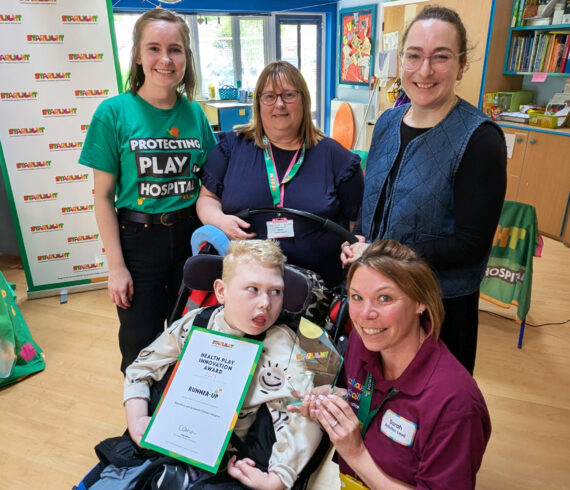Hope House and Tŷ Gobaith Children’s hospices were selected by our panel of judges as a runner-up in our Innovation Awards for their work developing a series of accessible events to help children and their families make precious memories.
Starlight has been holding its first annual Innovation in Health Play Awards to recognise and celebrate inspirational healthcare professionals who have used pioneering ideas to improve children’s healthcare experiences.
Hope House which has two sites - Hope House in Oswestry, Shropshire and Tŷ Gobaith (Welsh for Hope House) in Conwy, north Wales - was selected as a runner up for developing an exciting and accessible programme of events to support families of children with life-limiting conditions. Play leaders Sarah Brown and Di Lloyd are pictured accepting the award.
The team, which includes play specialists, physiotherapists, occupational therapists and family support workers, started developing a wide range of events last year, including forest school, swimming, sensory play and story sessions. They also hold rock music and drumming workshops, gardening and nature trail walks as well as family fun days and special events at Halloween, Christmas and Easter. A programme they are constantly developing bringing families together so they can support each other and enabling access to activities they could not usually attend because of cost or their situations.
Esme Turner, the project lead, said the team was really excited about the award:
Thank you so much for recognising the therapy teams’ hard work and dedication to making precious memories through play at family events at Tŷ Gobaith and Hope House.”
Siblings talked about wanting to do normal family things and not being able to due to the needs of the life-limited child. Families also told us that they wanted to spend time together making memories and that they felt isolated, and alone, so we wanted to create opportunities for families to come together. Friendships have been formed from these sessions and families have reported feeling less isolated.

Case Study
William Seymour (pictured with his mum Susie, Hope House play staff and Starlight's Insights and Impact Manager May Shakespeare) and his family have benefited from the events held at the hospices. They said there is nowhere else locally where they can experience special family moments.
His mum Susie said: “When we first came here there were children playing and there was much going on. It’s the only place that we get any sense of normality as a family.
“Will loves being outdoors in the gardens and adores all the attention that he gets. Watching him interact with the other children is also special because it doesn’t happen at home. These are moments that will stay with us forever.”
Karen Wright, Head of Care at Hope House Children’s Hospices, said: “As children’s hospices we are here to give every local child with a life-threatening condition and their family access to professional care and improve their quality of life from the point of diagnosis.
“Being able to be creative and flexible in how we meet individual family’s needs and help them create those precious memories as a family truly meets our purpose. Empowering children to play and seeing the smiles on their faces is inspirational and the very best way to capture those quality moments.
“We are very grateful to Starlight for all the support they have given to us to help us meet our purpose, with the children and their families at the heart of everything that we do.”

Cathy Gilman, Chief Executive of Starlight, said: We loved the hospice team’s innovation of setting up a programme of fun and playful events for families. We admire how they asked them about the barriers to accessing community activities so they could develop a programme specifically tailored to their needs - bringing play into the lives of the whole family, boosting wellbeing. Their work demonstrates the remarkable impact this can have on building connections, helping them feel less isolated and more included. We particularly wanted to celebrate the positive impact that health play can have in a non-hospital setting, which is often less understood and underappreciated.
